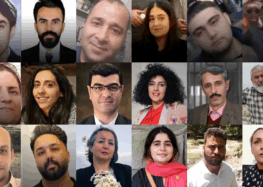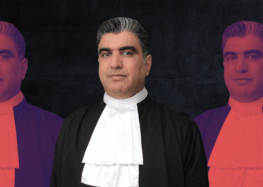Detention Continues for Woman Attempting to Attend Volleyball Match
The decision to extend the temporary detention orders of Ghoncheh Ghavami, the young woman with dual British-Iranian citizenship who was arrested for trying to attend a volleyball game in Tehran, is under court review after Ghavami’s lawyer filed a formal objection. The family of Ghavami has also objected strenuously to her continued detainment.
Prolonged “temporary detention” in Iran is often used to extract forced confessions from prisoners of conscience, frequently under coercion, as during this and the “investigation” phase suspects do not have access to counsel. Interrogators are often able to extract “confessions” during this period which are then the sole basis for conviction. As such, “temporary detention” represents an egregious denial of due process and a serious human rights violation.
In an interview with the International Campaign for Human Rights in Iran, the brother of Ghoncheh Ghavami, said, “We objected to the third extension of her ‘temporary detention’ orders, and our objection is under review in court at this time. We hope the court will rule to revoke the temporary detention orders, and that Ghoncheh is released quickly without a conviction, because she has done nothing wrong,” said Saeed Iman Ghavami.
“In her last visit with the family, my sister said that her biggest wish is to be released from this state of limbo, and to be freed sooner. She must be released and she should not be convicted. Ghoncheh has done nothing except that she wanted to see the Iran-Italy volleyball game,” said Iman Ghavami.
Ghoncheh Ghavami, 25, who holds dual citizenship from Iran and the United Kingdom, is a law graduate from SOAS, University of London. She returned to Iran in March 2014 upon completion of her studies. Ghavami was among a group of women who appeared outside Tehran’s Azadi Sports Stadium on June 25, to attend the Iran-Italy volleyball game. Iranian authorities did not allow the women to attend the event. Ghavami and a group of other women were arrested and transferred to Tehran’s Vozara Complex. They were later released, after they signed a letter of recognizance and their personal belongings were confiscated.
When Ghavami appeared at the Vozara Complex on the morning of June 30 to claim her confiscated belongings, she was arrested without any explanation, and was kept inside a solitary cell at Evin Prison for more than a month. According to Kaleme, following her June 30 arrest, agents appeared at her home and searched the premises.
“We don’t know what Ghoncheh’s charges are, and we don’t even know where exactly she is being kept. The Investigative Judge in her case has told the family that she is inside IRGC’s Ward 2-A at Evin Prison, but some officials have also said that she is inside Ward 240 at Evin Prison. All we know is that Ghoncheh spent 41 days in a solitary cell, and now she has been sharing a cell with a woman,” said Iman Ghavami.
Houshang Azam Ghavami, Ghoncheh Ghavami’s father, told ILNA on September 12 that his daughter had returned to Iran after completing her studies abroad, “in order to serve and help her motherland,” and that she was not involved in any political activities. Houshang Ghavami, a physician, helped treat soldiers on the Iran-Iraq War front line for eight years (1980-1988). “So far I have written various letters to Head of the Judiciary, the President, the Prosecutor, and some top officials, but none of them have replied to these letters and they don’t announce the reasons and charges for which my daughter is in detention,” he told ILNA.
Ghoncheh Ghavami’s lawyer, Seyed Mahmoud Alizadehh Tabatabaee, also told ILNA on September 12 that Ghoncheh Ghavami was not involved in any political activities. “Ghoncheh Ghavami’s detention orders were extended recently. We have objected to the orders, and the case has been forwarded to the court to review the objection. I hope that my client’s detention orders are soon overturned and that she is released.”







